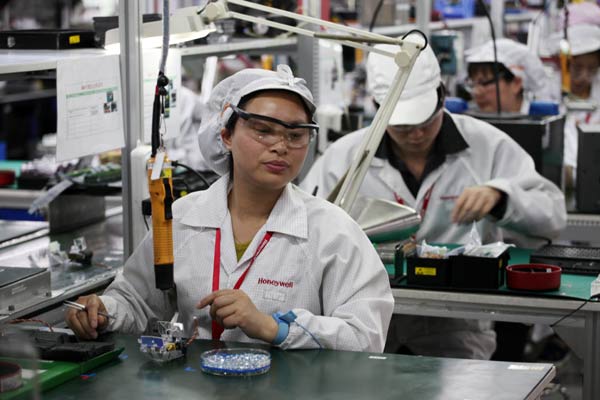Automation, productivity and growth
Updated: 2015-09-01 08:20
By Michael Spence(china Daily)
|
||||||||
 |
|
A production line of Honeywell International Inc in Suzhou, Jiangsu province. The company will consider China its "second headquarters" for automation and control solutions activities.[Photo/China Daily] |
It seems obvious that if a business invests in automation, its workforce - though possibly reduced - will be more productive. So why do the statistics tell a different story?
In advanced economies, where plenty of sectors have both the money and the will to invest in automation, growth in productivity (measured by value added per employee or hours worked) has been low for at least 15 years. And, in the years since the 2008 global financial crisis, these countries' overall economic growth has been meager, too - just 4 percent or less on average.
One explanation is that the advanced economies had taken on too much debt and needed to deleverage, contributing to a pattern of public-sector underinvestment and depressing consumption, as well as private investment. But deleveraging is a temporary process, not one that limits growth indefinitely. In the long term, overall economic growth depends on growth in the labor force and its productivity.
Hence, the question on the minds of politicians and economists alike: Is the productivity slowdown a permanent condition and constraint on growth, or is it a transitional phenomenon?
But there is more to the productivity conundrum than the 2008 crisis. In the two decades that preceded the crisis, the sector of the US economy that produces internationally tradable goods and services - one-third of overall output - failed to generate any increase in jobs, even though it was growing faster than the non-tradable sector in terms of value added.
Most of the job losses in the tradable sector were in manufacturing industries, especially after 2000. Although some of the losses may have resulted from productivity gains from information technology and digitization, many occurred when companies shifted segments of their supply chains to other parts of the world.
By contrast, the US non-tradable sector - two-thirds of the economy - recorded large increases in employment in the years before 2008. However, these jobs - often in domestic services - usually generated lower value added than the manufacturing jobs that had disappeared. This is partly because the tradable sector was shifting toward employees with high levels of skill and education. In that sense, productivity rose in the tradable sector, although structural shifts in the global economy were surely as important as employees becoming more efficient at doing the same things.
Unfortunately for advanced economies, the gains in per capita value added in the tradable sector were not large enough to overcome the effects of moving labor from manufacturing jobs to non-tradable service jobs (many of which existed only because of credit-fueled domestic demand in the halcyon days before 2008). Hence, the muted overall productivity gains.
The organizing principle of global supply chains for most of the post-war period has been to move production toward low-cost pools of labor, because labor was and is the least mobile of economic factors (labor, capital and knowledge). That will remain true for high-value-added services that defy automation. But for capital-intensive digital technologies, the organizing principle will change: production will move toward final markets, which will increasingly be found not just in advanced countries, but also in emerging economies as their middle class expands.
Organizations, businesses and people all have to adapt to the technologically driven shifts in our economies' structure. These transitions will be lengthy, rewarding some and forcing difficult adjustments on others, and their productivity effects will not appear in aggregate data for some time. But those who move first are likely to benefit the most.
The author, a Nobel Prize winner in Economics, is professor of economics at New York University's Stern School of Business and senior fellow at the Hoover Institution.
Project Syndicate
- Global health entering new era: WHO chief
- Brazil's planning minister steps aside after recordings revelation
- Vietnam, US adopt joint statement on advancing comprehensive partnership
- European border closures 'inhumane': UN refugee agency
- Japan's foreign minister calls A-bombings extremely regrettable
- Fukushima impact unprecedented for oceans: US expert

 Stars of Lijiang River: Elderly brothers with white beards
Stars of Lijiang River: Elderly brothers with white beards
 Wealthy Chinese children paying money to learn British manners
Wealthy Chinese children paying money to learn British manners
 Military-style wedding: Fighter jets, grooms in dashing uniforms
Military-style wedding: Fighter jets, grooms in dashing uniforms
 Striking photos around the world: May 16 - May 22
Striking photos around the world: May 16 - May 22
 Robots help elderly in nursing home in east China
Robots help elderly in nursing home in east China
 Hanging in the air: Chongqing holds rescue drill
Hanging in the air: Chongqing holds rescue drill
 2.1-ton tofu finishes in two hours in central China
2.1-ton tofu finishes in two hours in central China
 Six things you may not know about Grain Buds
Six things you may not know about Grain Buds
Most Viewed
Editor's Picks

|

|

|

|

|

|
Today's Top News
Liang avoids jail in shooting death
China's finance minister addresses ratings downgrade
Duke alumni visit Chinese Embassy
Marriott unlikely to top Anbang offer for Starwood: Observers
Chinese biopharma debuts on Nasdaq
What ends Jeb Bush's White House hopes
Investigation for Nicolas's campaign
Will US-ASEAN meeting be good for region?
US Weekly

|

|









